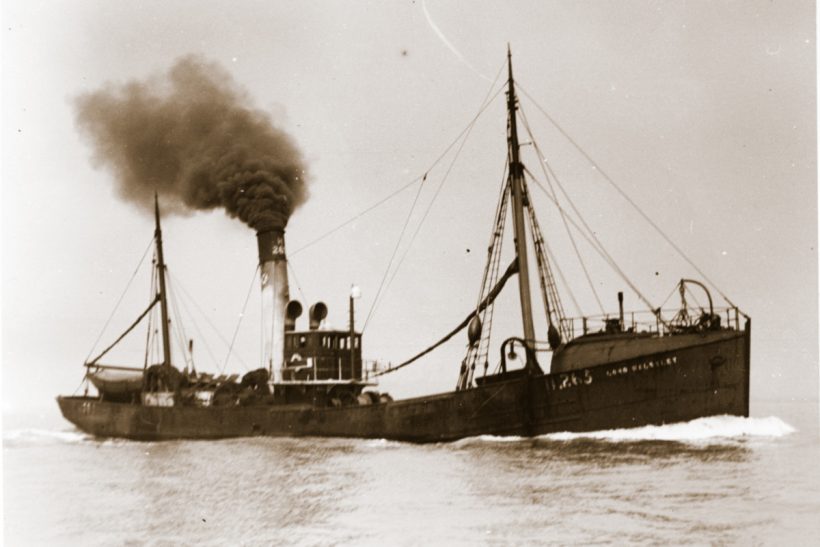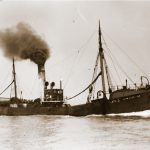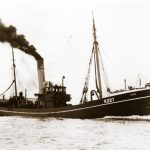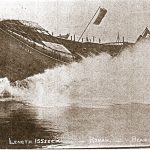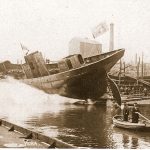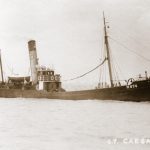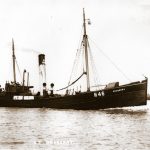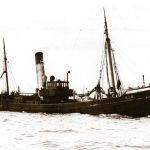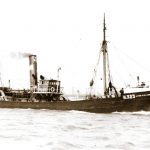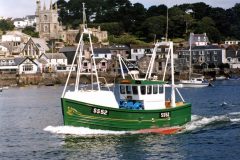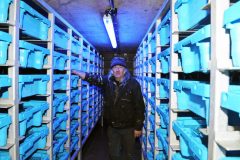The sixth article in the series by Hull skipper William Oliver, first published in 1953/4. All photographs courtesy of Alec Gill
In 1910, the UK Admiralty established a minesweeping section of the Royal Naval Reserve (RNR). As fishermen were used to dealing with towing wire ropes and handling equipment at sea, they were considered to be particularly suitable for this service.
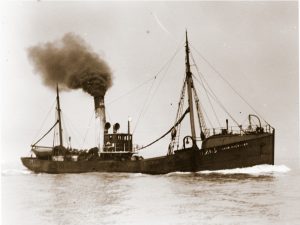
Skipper Oliver took command of Lord Wolseley H 263 in 1911, after completing his training to serve as a skipper in the newly formed minesweeping section of the Royal Naval Reserve – the first Hull skipper to do so. He stayed in her until August 1912, when he took command of a new vessel, Lord Nunburnholme.
I applied to join the service and completed my training on 11 July, 1911, becoming the first Hull RNR skipper, and the only one for over a year.
Immediately after my training was completed, I shipped skipper of the Lord Wolseley again, as her regular skipper was coming ashore to take over as skipper of Lord Knollys, a new ship. I was now once more a regular skipper in the Yorkshire Steam Fishing Company.
Records are broken
Let us look back at the developments in the industry at that time. Records were being broken year by year, Oliver Cromwell’s record being broken by Marshall Oyama (P&H), skipper J Frost, who made £1,335 in November 1908. He broke his own record in April 1909 by making £1,447 in Yokohama. This record was broken by skipper NK Keilson (with Macfarlane, I believe) with £1,560. The 140ft trawler had now arrived, prominent among the class being Roman, Saxon, Dane and Norman (Hellyer’s), Coltman and Botanic (City SF Co), Vera (Humber SF Co) and several others.
The 2,000-kit landing had now been attained, the first ship that I remember reaching this mark being Vera with Chris Poulson as skipper. Some salt fish companies had opened out in Hull, notably A&M Smith & Co, who split and salted fish for export. This proved a good outlet for surplus cod after the fresh market had been satisfied, and the industry was at this time very prosperous.
The bonus system
A new departure in skippers’ remuneration had been introduced about 1907/8, when the keen competition amongst owners to obtain successful skippers led to the institution of a bonus system. In consideration of a certain fixed sum of money grossed for the completed year, skippers were granted a bonus on a percentage basis. These varied according to the rules of the companies.
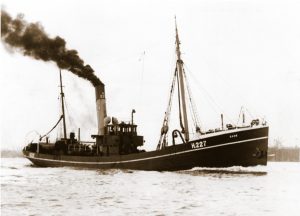
Dane H 227 was one of a new class of 140ft trawlers built in this period for Hull trawler owner Hellyer’s.
In my case, if I grossed £6,000 for the year I received £50, with an increasing percentage for a higher gross amount. Naturally, as the ships became larger and running expenses heavier, the initial gross figure was increased, but for the whole of the time that bonuses were in force, I am pleased to say I never missed reaching the initial figure and attaining a bonus. This system is, of course, discontinued nowadays.
By 1911, most of the trawlers which were not built with whalebacks had now had them constructed, as they had proved so advantageous.
Another box fleet had come into operation about 1906, owned by Hellyer’s. They were fine craft, all being named after Shakespearean characters: Antonio, Brutus, Caesar, Dogberry, etc. At first the cutters landed in Hull, but for some reason it did not prove profitable and eventually they landed in London, like the others.
So in 1911, we had four box fleets owned in Hull, Red Cross, Great Northern, Gamecock and Hellyer’s, and about that time there were probably more trawlers operating from Hull than at any time in the history of the industry.
I remained in Lord Wolseley until August 1912, when I was promoted to a newer and larger vessel, the Lord Nunburnholme. Then, in 1913, I got a bigger craft, the Lord Roberts, and in 1914, the Lord Salisbury, a new edition of the vessel in which I was first a skipper.
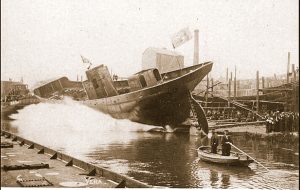
Vera H 960 being launched at the famous Cook, Welton and Gemmell yard in Beverley near Hull. Vera was thought to be the first Hull trawler to land 2,000 kits (one kit was 10 stone) from one trip, skippered by Chris Poulson, in around 1910. The Beverley yard built scores of trawlers for the distant-water fleets of Hull, Grimsby and Fleetwood in the first half of the 20th century.
During this time my increasing experience and confidence meant that I was gradually earning more and more and making my way towards the first flight of skippers in the Yorkshire Co, and at that time, at the age of 30, the world was to me a very beautiful place. I had a family of seven – four sons and three daughters – and I was perfectly happy and contented with my life.
I have often been asked whether luck does not help a great deal towards making a successful skipper. There are of course many points of view, but my considered opinion is that golden opportunities certainly do come some people’s way, but it is up to the skipper to grasp them when they do come and not to depend on them. One should always learn everything possible about fishing grounds and fishing gear, and have some sort of a system in working one’s vessel. But I have to admit that luck, particularly in one’s early career, plays a big part in the ultimate success of the skipper.
A lucky trip
I will give just two examples of how a certain amount of luck helped to consolidate my position in the Yorkshire Co. One year, we left Hull in late December and ran into a heavy gale in the North Sea. As the wind was SSE it was too bad to run before, and we had to haul to for three days. We had a gruelling passage to Iceland, and it was not until the ninth day that we arrived at the fishing grounds off Onundar Fjord. It was reasonably good fishing weather when we arrived, but I was very tired and had a severe cold, so I decided to anchor for a night’s rest and to get the gear ready. All the vessels outside were fishing. The next morning, I weighed anchor and proceeded out to fish. As I was steaming out, I passed a long line of vessels steaming in, and several skippers hailed me to say it was blowing a gale off the land from NE. I was peeved about losing the previous night and in my obstinacy carried on, intending if possible to get my gear down. I must have passed 20 trawlers steaming in.
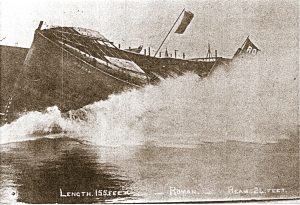
Roman H 948, another of the new 140ft vessels for Hellyer’s built during this period, at her launch in Beverley. Hellyer’s traditionally named its vessels after nationalities and Shakespearean characters.
After I had gone about six miles from the fjord, I saw that fishing operations would be impossible where I wanted to be (about 12 miles off), but I was still determined to fish and headed for the mouth of Isa Fjord to get some shelter from the land. I shot the gear, but by this time it was snowing and blowing a terrific gale from ESE. We went SE up the fjord, but by the time I had the gear down for an hour, I was glad to haul. The net was hanging down a dead weight and I thought we had caught the mud. After some difficulty, we got the codend up and found we had a huge bag of plaice, 74 baskets, to be exact. As it was impossible to shoot again, I steamed under the land and anchored.
The next morning, it was blowing nearly as hard but clear, so I steamed out to the estimated position and shot the gear and towed for an hour. We got 80 baskets, 40 of plaice and 40 of haddocks, and carried on fishing until we filled the decks. We anchored again to clear away and have a little sleep, and then went off again. We did the same the next night, and filled the decks once more. All this time the other vessels were still anchored, as it was still blowing very hard. I was about to drop the anchor when I noticed most of the other trawlers steaming out to fish. So as we had managed to get about 600 kits, with 300 of plaice, I decided to go home, expecting a good market because of the bad weather. We landed in Hull after 19 days away and made £724, and this was one of the best trips I had ever made up to that time. There is no doubt we were very lucky.
Good Friday bonus
Another example occurred in 1913. I had received information from Mr McCann that one of our vessels was bound home with a good voyage from Dyra Fjord. As I had a fair amount of experience in that locality, Mr McCann recommended me to go there for a voyage for Good Friday. As it was in March, there was fish at Westmann Isles, much nearer home than Dyra, but I obeyed instructions and went straight there.
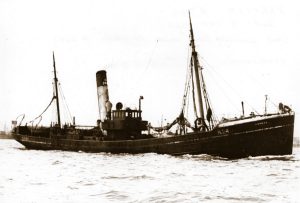
Norman H 249 was another of the new 140ft class being built at this time. The Norman pictured is believed to have been built in 1911, but Hellyer’s built at least four vessels of this name in this era, and it has not been possible to verify which one this is.
We had four fairly good hauls when it came to blow from the NE and fishing became impossible. I steamed in to Dyra Fjord and anchored. The bad weather persisted and we remained anchored day after day, until I could see no chance of landing before Good Friday. I was so worried I decided to telegraph Mr McCann, and sent the following wire: “Succession of NE gales. Am afraid if I remain here impossible to land before Good Friday. Fishing prospects fair when weather permits. Wire instructions please.” I received the reply: “If cannot obtain voyage for Good Friday remain until can.” So that was that.
We remained anchored another day and then steamed out. When we arrived at the fishing grounds it was still blowing hard, but by this time I was tired of inaction and steamed to Staalbierg Huk and shot the trawl off Redsand Bay where there was shelter. We had the gear down for an hour when it caught fast on a rock. The pull on the warp snapped the gallows off by the deck and it ran down the warp. We tried all we knew to recover the gear, but after two hours both warps parted and we lost the lot, gallows included.
We had now 150 kits to show for a fortnight out and could work only one gear. As this was an impossible situation, I decided to steam south to where the bottom was reasonably fine. We arrived off Utskalar, and fishing there were several Yorkshire Co trawlers who had sailed out with us. They had good voyages onboard and were nearly ready for home. I shot the gear with them, but after 10 minutes was fast. We hauled and mended the badly torn net and shot again. Again the net was badly damaged. So I steamed four miles further south and put a buoy down off Osar Bay.
We shot and towed for one and a half hours and had a big bag, but when we hauled, the codend burst and we lost the lot. I was nearly frantic. We put a new codend in and shot again, but after a few good hauls the fish took off. I had seen some of our vessels steam past me towards home but I carried on, and in view of our situation decided to have one more try, this time within the limits. So I called the mate on the bridge. He was Sam Greaves (now a well-known and successful skipper), and it was his first trip as mate. I explained the position and asked him if he was prepared to take the risk, with the reminder that if we were caught by the fishing cruiser we should do our trip for nothing, for besides being in debt we should also get the sack. His reply was: “If it’s good enough for you, skipper, it’s good enough for me.”
So we set to work, keeping inside most of the time, and for two days we were packed out with fish and had no sleep for nearly 60 hours. I had determined not to look out for the gunboat, as when one starts doing that it is easy to imagine that every vessel one sees is out to get you. Eventually we had a very nice trip, and deciding not to chance my luck any further, made up my mind to go home. We landed on the Thursday before Good Friday, the only ship in!



